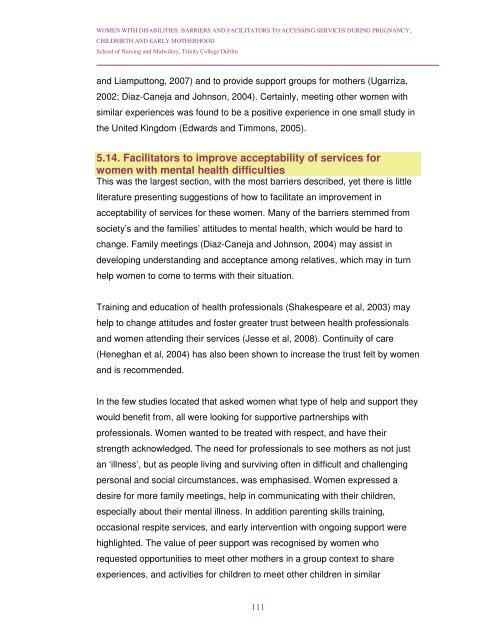Women with Disabilities: Barriers and Facilitators to Accessing ...
Women with Disabilities: Barriers and Facilitators to Accessing ...
Women with Disabilities: Barriers and Facilitators to Accessing ...
You also want an ePaper? Increase the reach of your titles
YUMPU automatically turns print PDFs into web optimized ePapers that Google loves.
WOMEN WITH DISABILITIES: BARRIERS AND FACILITATORS TO ACCESSING SERVICES DURING PREGNANCY,CHILDBIRTH AND EARLY MOTHERHOODSchool of Nursing <strong>and</strong> Midwifery, Trinity College Dublin<strong>and</strong> Liamput<strong>to</strong>ng, 2007) <strong>and</strong> <strong>to</strong> provide support groups for mothers (Ugarriza,2002; Diaz-Caneja <strong>and</strong> Johnson, 2004). Certainly, meeting other women <strong>with</strong>similar experiences was found <strong>to</strong> be a positive experience in one small study inthe United Kingdom (Edwards <strong>and</strong> Timmons, 2005).5.14. <strong>Facilita<strong>to</strong>rs</strong> <strong>to</strong> improve acceptability of services forwomen <strong>with</strong> mental health difficultiesThis was the largest section, <strong>with</strong> the most barriers described, yet there is littleliterature presenting suggestions of how <strong>to</strong> facilitate an improvement inacceptability of services for these women. Many of the barriers stemmed fromsociety’s <strong>and</strong> the families’ attitudes <strong>to</strong> mental health, which would be hard <strong>to</strong>change. Family meetings (Diaz-Caneja <strong>and</strong> Johnson, 2004) may assist indeveloping underst<strong>and</strong>ing <strong>and</strong> acceptance among relatives, which may in turnhelp women <strong>to</strong> come <strong>to</strong> terms <strong>with</strong> their situation.Training <strong>and</strong> education of health professionals (Shakespeare et al, 2003) mayhelp <strong>to</strong> change attitudes <strong>and</strong> foster greater trust between health professionals<strong>and</strong> women attending their services (Jesse et al, 2008). Continuity of care(Heneghan et al, 2004) has also been shown <strong>to</strong> increase the trust felt by women<strong>and</strong> is recommended.In the few studies located that asked women what type of help <strong>and</strong> support theywould benefit from, all were looking for supportive partnerships <strong>with</strong>professionals. <strong>Women</strong> wanted <strong>to</strong> be treated <strong>with</strong> respect, <strong>and</strong> have theirstrength acknowledged. The need for professionals <strong>to</strong> see mothers as not justan ‘illness’, but as people living <strong>and</strong> surviving often in difficult <strong>and</strong> challengingpersonal <strong>and</strong> social circumstances, was emphasised. <strong>Women</strong> expressed adesire for more family meetings, help in communicating <strong>with</strong> their children,especially about their mental illness. In addition parenting skills training,occasional respite services, <strong>and</strong> early intervention <strong>with</strong> ongoing support werehighlighted. The value of peer support was recognised by women whorequested opportunities <strong>to</strong> meet other mothers in a group context <strong>to</strong> shareexperiences, <strong>and</strong> activities for children <strong>to</strong> meet other children in similar111
















